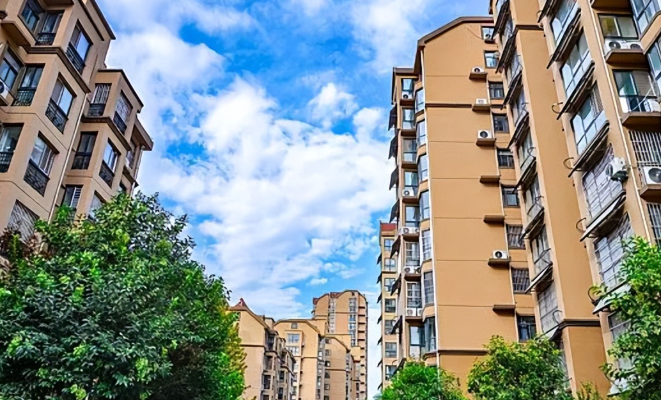For the past 20 years, rural populations have flocked to cities, and housing prices soared all the way up, making real estate the most profitable sector. Countless people went all-in, leveraging heavily to buy houses as investments.
Yet, business tycoon Jack Ma poured cold water on the frenzy —
“In the future, houses will be as cheap as onions.”
At the time, people dismissed this as nonsense, some even laughed at him for being out of touch with market reality.
Now, eight years later, looking at today’s situation, his words sound eerily accurate…

1. From Soaring to Falling — Jack Ma’s Prediction Comes True
A netizen shared:
“In 2015, our houses were under 10,000 yuan per square meter. By 2021, they shot up to 70,000. I panicked, fearing they’d really hit 100,000 like agents claimed. I couldn’t resist and borrowed 5 million yuan to buy one. I thought I was set to make 3 million, so I spent freely, believing the house would cover it.
But just two years later, things changed. I bought at the peak. Now I list it for just over 3 million, and barely anyone asks. It’s worth less than my loan. Default? That ruins my credit. Repay? The pressure is crushing…”
This story is not an exception. Across the country, similar cases abound. Since mid-to-late 2021, housing prices began to fall, first in third- and fourth-tier cities, then spreading to top-tier ones.
Today, even in Beijing, Shanghai, and Shenzhen, prices have fallen 30% from the peak, with weaker properties dropping back to 2016 levels.
As one former top-selling agent sighed:
“Now selling a house feels harder than selling cabbage.”
The data is sobering:
- New commercial housing sales area nationwide dropped 14.3% year-on-year, equivalent to nearly 20 Shenzhens worth of unsold apartments.
- The average price across 100 cities keeps falling — in July alone, it dropped another 7%.
The real estate market has entered profound transformation.

2. Why Real Estate May Face Big Changes
The signs of a new era are clear. Main reasons include:
① Population structure has flipped
- Before: fewer elderly, more young people, surging birth rates, rural migration into cities — housing prices kept climbing.
- Now: young people delay marriage and childbearing; many even return to rural areas due to high urban living costs.
- China’s population is shrinking: experts project another 2 million fewer people this year, while seniors aged 60+ already number 310 million.
- Over the next decade, 20 million retirements each year will release more properties into the market, increasing supply.
- Meanwhile, young people face income drops, earning only 3,000–4,000 yuan per month, barely enough to live on — let alone buy a home.
② Mounting inventory pressure
- Official stats: 750 million m² of unsold housing in 2023 → 750 million m² in 2024, or 7.5 million units waiting for buyers.
- Secondary listings: 7.3 million units nationwide.
- Vacancies: Southwest University of Finance estimated a 21.4% vacancy rate, about 130 million homes — enough for 300–400 million people.
- In small cities, nighttime lighting rates drop below 30%, turning districts into ghost towns.
- Developers struggle too: Evergrande, Country Garden and many smaller firms face crippling debt, with thousands of companies collapsing. 2025 may be even worse.
③ Domestic & global economic turbulence
- Pandemic, geopolitical conflicts, trade wars → global slowdown.
- Residents’ income expectations drop, exports suffer, debts rise.
- Real estate, long tied to local government finance, is caught in a negative loop of weak demand and shrinking consumption.

3. What to Expect in 2025
① Population imbalance intensifies
- The 1963 baby boom generation is entering retirement. In 2025, retirements surge. As retirees sell off properties for cash, oversupply could worsen.
② Debt crisis for developers
- 2025 is a debt repayment peak: top 100 developers face 3 trillion yuan in repayments.
- Companies’ top priority is no longer profit, but fire sales to raise cash.
③ Property tax may arrive
- Former finance minister Lou Jiwei has called for real estate tax pilots.
- Once implemented, multi-property owners will face higher costs, pushing them to sell off extra homes, further flooding the market.

4. How Ordinary People Should Respond
① Buying? Don’t follow the herd
- Yes, prices have dropped for three years, but don’t just jump in. Ask yourself: do you really need it, and can you handle monthly mortgage stress? If not, rent. If yes, buy only for genuine need.
② Investing in property? Invest in yourself instead
- In the future, housing will have a 2-8 effect: only 20% of properties retain real value.
- Without expertise or capital, real estate speculation is risky. Instead, invest in your own skills. With stronger earning power, you’ll never worry about affording a home.
References
- National Bureau of Statistics real estate data
- State media housing reports
- Research by Southwest University of Finance and Economics



